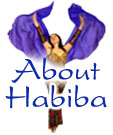- »Classes
- »Workshops/
Special Events - »Calendar
- »Gallery
- »Links
- »About Belly Dance








Habiba
The Studio
Habiba Dance Ensemble
DVDs
Habiba presents:
On a Marvelous Night
Only $29.95....Buy it now!
Click here for more DVDs.

 A new DVD featuring seven never before released solo performances by Habiba
of her most popular belly dance and folkloric choreographies. This 98 minute
DVD also includes a performance by Habiba and the entire Habiba Dance Ensemble
of her new troupe choreography, "The Nile Opus," filmed at the opening of the
University of Pennsylvania Museum of Archaeology and Anthropology's exhibition,
"Amarna" on November 12, 2006.
A new DVD featuring seven never before released solo performances by Habiba
of her most popular belly dance and folkloric choreographies. This 98 minute
DVD also includes a performance by Habiba and the entire Habiba Dance Ensemble
of her new troupe choreography, "The Nile Opus," filmed at the opening of the
University of Pennsylvania Museum of Archaeology and Anthropology's exhibition,
"Amarna" on November 12, 2006.

Purchase Habiba's DVD On a Marvelous Night today!

Review: On a Marvelous Night: 8 performances by Habiba of her greatest choreographies
by Farasha
Over the many years I've known Habiba of Philadelphia, I've had the pleasure of seeing both her
and her troupe perform many of her choreographies at seminars and shows. I've always been
impressed by her choreographic skill, her sensitivity to the music, the great diversity of her work,
and her elegant approach to dance. To my delight and I suspect to the delight of many
bellydance aficionados, Habiba has compiled some of her best performances onto one DVD.
On a Marvelous Night features seven solo performances, both choreographed and
improvisational, plus a special bonus presentation of the Habiba Dance Ensemble's Nile Opus, a
live performance filmed at the University of Pennsylvania Museum of Archaeology and
Anthropology for the opening of the Amarna exhibition in November, 2006.
Bahebak "I Love You"
This number was performed at the Festival of Oriental Dance, Minneapolis, MN in 2006. In a
red and rose-color costume, and to fabulous music by Dr. Samy Farag, Habiba offers up classical
Egyptian styling and a fine Middle Eastern routine - controlled, subtle and classy, with careful
attention to every accent and nuance in the music. Her choreography responds to changes in the
rhythm, mood, and tempo; sharp articulate movements complement the fast-paced music. In
contrast, two taxims feature delicate shimmying and beautiful, expressive movements. A lively
finale puts the finishing touches on this truly great routine.
Baladi Improvisation
This is the earliest number on the DVD, performed at the Shubin Theater in Philadelphia in
1998. Here Habiba demonstrates the art of improvisation to perfection to the brilliant live music
of Roger Mgrdichian on oud; Hamit Golbasi on zurna and Joseph Tayoun on dumbek. The
improv moves in a slow, snakey progression to an earthy baladi, which Habiba captures with
passion and precision. As the music accelerates, her dance becomes more intense, flinging her
hair in Zar-like fashion as the tempo increases. The zurna makes an entrance in the final,
folkloric chapter of the dance, and Habiba ends the number with an energetic finale.
Raqs Al Juzur
The Tunisian Pot Dance is one of Habiba's signature folkloric numbers, here presented at the
Festival of Oriental Dance, Minneapolis, MN 2006. This traditional dance from the islands of
Djerba and Kerkennal in the south of Tunisia is performed by both men and women and is a
celebration of pottery-making, the islands' main industry. Habiba enters in the traditional Tunisian overdress. The Pot dance is characterized by the familiar twisting hip movements,
which allow the yarn tassels of the belt to swing back and forth, emphasizing the horizontal
movement of the hips. At the same time, Habiba effortlessly balances a Tunisian pot or jug on
her head. She even descends to the floor with it still in place, finally removing it at the end.
Gawaher with Drum Solo
Habiba taught and performed this fabulous routine at a seminar/hafla last year sponsored by
Su'ad and myself in New Jersey. Habiba's shimmering blue costume is the perfect complement to
this classic Oriental dance with beautiful music once again of Dr. Samy Farag. Habiba spices up
the choreography with great little Egyptian nuances and a dynamite baladi section, ending the
routine with an exciting drum solo.
On a Marvelous Night
This choreography, performed at the International house of Philadelphia, in May 2006, was
inspired by a 14th century poem. The inspiration for the DVD title, the music is a fascinating
meld of contemporary Arabic jazz and medieval Andalusian music. This is also my favorite
number on the DVD and I think it's one of Habiba's most original and unusual choreographies,
an exquisite dance that gives new meaning to the word, "fusion." Habiba takes the stage in a
black slinky gown with a flounced bottom, the only color a blood-red rose in her hair. The
dance begins as a subtle blend of the distinct Andalusian style with its artful and elegant Spanish
arms, and the more earthy Arabic style. Suddenly the music morphs into steamy jazz and
Habiba responds with languorous, sultry movements and sharp, modernistic movements. At its
conclusion, the music and movements return to the traditional Moorish style, bringing the dance
full circle. It's a brilliant and courageous choreography and perhaps signals some exciting
new directions in Habiba's creative work.
Alf Leyla
This is another improvisational Egyptian-style bellydance routine, to live music by Bill
Koutsouris, Bill Tayoun and Adeeb Rafella at the International House in Philadelphia, May
2005. Habiba in sparkling black and silver bedlah again demonstrates her strength in
improvisational works. Hers is a particularly lovely interpretation of this timeless classic, one of
the most gorgeous pieces of music in the Middle Eastern dance repertoire. She finishes the piece
with a kicky little drum solo which showcases some nice interplay between the dancer and the
live musicians.
Leilat Hob
Once again dancing to a live band, Habiba brings scintillating life to another
favorite dance classic, in a black Hanan gown that also shimmers with rainbow colors. The main
theme of the song is followed by a wonderfully slow chiftitelli and a particularly expressive
taxsim, with a lively drum solo at the finish.
The Nile Opus
This live performance by the Habiba Dance Ensemble, filmed at the opening of the Amarna
exhibition at the University of Pennsylvania Museum of Archaeology and Anthropology in
November of 2006, takes the viewer on an historic journey through Egyptian dance and music.
Beginning with ancient times, the ensemble opens with a fanciful number: four dancers enter in
shimmery silver catsuits, with floating dark blue veils sprinkled with stars symbolizing the
birth of Egypt beneath a starlit desert sky. In the second number, in costumes derived from
ancient temple walls, dancers perform to a musical reconstruction and choreography that was
inspired by drawings of dancers' positions from the ancient sources. Habiba's DVD notes
explain that while we don't know precisely what the ancient Egyptian dances looked like, we
have a good idea from those tomb paintings and other drawings. The music of ancient Egypt is
also a mystery; some musicologists who have studied instruments depicted in temple paintings,
have fashioned modern reconstructions of them, in an attempt to re-create the music of ancient
Egypt.
These two are joined in the Nile Opus; the composer Michael Atherton provides the original music and, together with Habiba's reconstructed choreography, it's a fascinating glimpse of what ancient Egyptian music and dance may have looked like.
Habiba's ensemble moves from ancient to more modern folkloric sources with the lively Balas,
in which dancers in traditional Fellahin dresses carry their water jugs to the well, gossiping along
the way. The finale of the Nile Opus and the DVD features the Arabic pop tune "Walk Like
an Egyptian "a humorous rendition by the entire ensemble to the popular song by Hakim and
Cleopatra.
Habiba's strength as a choreographer lies in her ability to create a "moving picture" of the music
and the feeling behind the music. As a performer, Habiba interprets beautifully the many layers
of complexity that comprise Middle Eastern dance. She performs with a controlled energy -
elegant, yet understated, precise, yet fluid relying on the music to dictate and inspire the feel
and direction of the dance. As a teacher, she is exceedingly giving, with a deep knowledge of
Middle Eastern dance informed by years of studying and interpreting both Oriental and folkloric
styles, and she generously shares this with others.
On a Marvelous Night is well constructed, expertly edited by Ron Barber, and fully indexed for
ease of navigation. This wonderful compilation demonstrates the great depth of Habiba's
musicality and creativity in a variety of styles, and the maturing of an artist, performer and
choreographer over the years, who continues to grow with her art. I thoroughly enjoyed it.
Farasha is a performer, teacher & choreographer from Jackson, NJ. She is the co-sponsor, with Su'ad, of the annual Dancefest NJ and Master Teacher seminars in New Jersey and Connecticut.
Template design by Six Shooter Media.
This website and all photographs within, are
©2010 Barbara Siegel, and may not
be used without her permission.
Website maintained by Fatima Bassmah








Habiba
The Studio
Habiba Dance Ensemble
DVDs
On a Marvelous Night
Only $29.95....Buy it now!
Click here for more DVDs.
 A new DVD featuring seven never before released solo performances by Habiba
of her most popular belly dance and folkloric choreographies. This 98 minute
DVD also includes a performance by Habiba and the entire Habiba Dance Ensemble
of her new troupe choreography, "The Nile Opus," filmed at the opening of the
University of Pennsylvania Museum of Archaeology and Anthropology's exhibition,
"Amarna" on November 12, 2006.
A new DVD featuring seven never before released solo performances by Habiba
of her most popular belly dance and folkloric choreographies. This 98 minute
DVD also includes a performance by Habiba and the entire Habiba Dance Ensemble
of her new troupe choreography, "The Nile Opus," filmed at the opening of the
University of Pennsylvania Museum of Archaeology and Anthropology's exhibition,
"Amarna" on November 12, 2006.
Purchase Habiba's DVD On a Marvelous Night today!
by Farasha
Over the many years I've known Habiba of Philadelphia, I've had the pleasure of seeing both her and her troupe perform many of her choreographies at seminars and shows. I've always been impressed by her choreographic skill, her sensitivity to the music, the great diversity of her work, and her elegant approach to dance. To my delight and I suspect to the delight of many bellydance aficionados, Habiba has compiled some of her best performances onto one DVD. On a Marvelous Night features seven solo performances, both choreographed and improvisational, plus a special bonus presentation of the Habiba Dance Ensemble's Nile Opus, a live performance filmed at the University of Pennsylvania Museum of Archaeology and Anthropology for the opening of the Amarna exhibition in November, 2006.
Bahebak "I Love You"
This number was performed at the Festival of Oriental Dance, Minneapolis, MN in 2006. In a
red and rose-color costume, and to fabulous music by Dr. Samy Farag, Habiba offers up classical
Egyptian styling and a fine Middle Eastern routine - controlled, subtle and classy, with careful
attention to every accent and nuance in the music. Her choreography responds to changes in the
rhythm, mood, and tempo; sharp articulate movements complement the fast-paced music. In
contrast, two taxims feature delicate shimmying and beautiful, expressive movements. A lively
finale puts the finishing touches on this truly great routine.
Baladi Improvisation
This is the earliest number on the DVD, performed at the Shubin Theater in Philadelphia in
1998. Here Habiba demonstrates the art of improvisation to perfection to the brilliant live music
of Roger Mgrdichian on oud; Hamit Golbasi on zurna and Joseph Tayoun on dumbek. The
improv moves in a slow, snakey progression to an earthy baladi, which Habiba captures with
passion and precision. As the music accelerates, her dance becomes more intense, flinging her
hair in Zar-like fashion as the tempo increases. The zurna makes an entrance in the final,
folkloric chapter of the dance, and Habiba ends the number with an energetic finale.
Raqs Al Juzur
The Tunisian Pot Dance is one of Habiba's signature folkloric numbers, here presented at the
Festival of Oriental Dance, Minneapolis, MN 2006. This traditional dance from the islands of
Djerba and Kerkennal in the south of Tunisia is performed by both men and women and is a
celebration of pottery-making, the islands' main industry. Habiba enters in the traditional Tunisian overdress. The Pot dance is characterized by the familiar twisting hip movements,
which allow the yarn tassels of the belt to swing back and forth, emphasizing the horizontal
movement of the hips. At the same time, Habiba effortlessly balances a Tunisian pot or jug on
her head. She even descends to the floor with it still in place, finally removing it at the end.
Gawaher with Drum Solo
Habiba taught and performed this fabulous routine at a seminar/hafla last year sponsored by
Su'ad and myself in New Jersey. Habiba's shimmering blue costume is the perfect complement to
this classic Oriental dance with beautiful music once again of Dr. Samy Farag. Habiba spices up
the choreography with great little Egyptian nuances and a dynamite baladi section, ending the
routine with an exciting drum solo.
On a Marvelous Night
This choreography, performed at the International house of Philadelphia, in May 2006, was
inspired by a 14th century poem. The inspiration for the DVD title, the music is a fascinating
meld of contemporary Arabic jazz and medieval Andalusian music. This is also my favorite
number on the DVD and I think it's one of Habiba's most original and unusual choreographies,
an exquisite dance that gives new meaning to the word, "fusion." Habiba takes the stage in a
black slinky gown with a flounced bottom, the only color a blood-red rose in her hair. The
dance begins as a subtle blend of the distinct Andalusian style with its artful and elegant Spanish
arms, and the more earthy Arabic style. Suddenly the music morphs into steamy jazz and
Habiba responds with languorous, sultry movements and sharp, modernistic movements. At its
conclusion, the music and movements return to the traditional Moorish style, bringing the dance
full circle. It's a brilliant and courageous choreography and perhaps signals some exciting
new directions in Habiba's creative work.
Alf Leyla
This is another improvisational Egyptian-style bellydance routine, to live music by Bill
Koutsouris, Bill Tayoun and Adeeb Rafella at the International House in Philadelphia, May
2005. Habiba in sparkling black and silver bedlah again demonstrates her strength in
improvisational works. Hers is a particularly lovely interpretation of this timeless classic, one of
the most gorgeous pieces of music in the Middle Eastern dance repertoire. She finishes the piece
with a kicky little drum solo which showcases some nice interplay between the dancer and the
live musicians.
Leilat Hob
Once again dancing to a live band, Habiba brings scintillating life to another
favorite dance classic, in a black Hanan gown that also shimmers with rainbow colors. The main
theme of the song is followed by a wonderfully slow chiftitelli and a particularly expressive
taxsim, with a lively drum solo at the finish.
The Nile Opus
This live performance by the Habiba Dance Ensemble, filmed at the opening of the Amarna
exhibition at the University of Pennsylvania Museum of Archaeology and Anthropology in
November of 2006, takes the viewer on an historic journey through Egyptian dance and music.
Beginning with ancient times, the ensemble opens with a fanciful number: four dancers enter in
shimmery silver catsuits, with floating dark blue veils sprinkled with stars symbolizing the
birth of Egypt beneath a starlit desert sky. In the second number, in costumes derived from
ancient temple walls, dancers perform to a musical reconstruction and choreography that was
inspired by drawings of dancers' positions from the ancient sources. Habiba's DVD notes
explain that while we don't know precisely what the ancient Egyptian dances looked like, we
have a good idea from those tomb paintings and other drawings. The music of ancient Egypt is
also a mystery; some musicologists who have studied instruments depicted in temple paintings,
have fashioned modern reconstructions of them, in an attempt to re-create the music of ancient
Egypt.
These two are joined in the Nile Opus; the composer Michael Atherton provides the original music and, together with Habiba's reconstructed choreography, it's a fascinating glimpse of what ancient Egyptian music and dance may have looked like. Habiba's ensemble moves from ancient to more modern folkloric sources with the lively Balas, in which dancers in traditional Fellahin dresses carry their water jugs to the well, gossiping along the way. The finale of the Nile Opus and the DVD features the Arabic pop tune "Walk Like an Egyptian "a humorous rendition by the entire ensemble to the popular song by Hakim and Cleopatra.
Habiba's strength as a choreographer lies in her ability to create a "moving picture" of the music and the feeling behind the music. As a performer, Habiba interprets beautifully the many layers of complexity that comprise Middle Eastern dance. She performs with a controlled energy - elegant, yet understated, precise, yet fluid relying on the music to dictate and inspire the feel and direction of the dance. As a teacher, she is exceedingly giving, with a deep knowledge of Middle Eastern dance informed by years of studying and interpreting both Oriental and folkloric styles, and she generously shares this with others.
On a Marvelous Night is well constructed, expertly edited by Ron Barber, and fully indexed for ease of navigation. This wonderful compilation demonstrates the great depth of Habiba's musicality and creativity in a variety of styles, and the maturing of an artist, performer and choreographer over the years, who continues to grow with her art. I thoroughly enjoyed it.
Farasha is a performer, teacher & choreographer from Jackson, NJ. She is the co-sponsor, with Su'ad, of the annual Dancefest NJ and Master Teacher seminars in New Jersey and Connecticut.
Template design by Six Shooter Media.
This website and all photographs within, are
©2010 Barbara Siegel, and may not
be used without her permission.
Website maintained by Fatima Bassmah
